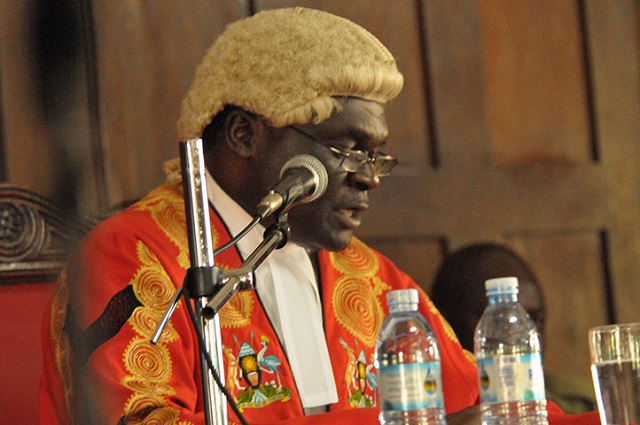
Kampala, Uganda | THE INDEPENDENT | The current system of funding the judiciary is inconsistent with the law, the Constitutional Court has ruled.
In a judgment delivered on Friday, the final member panel of the Constitutional Court Justices, say funding of the judiciary an independent arm of government through the Appropriation Act is inconsistent with the constitution and undermines its independence.
An Appropriation Act is a law that provides for the budgetary allocation for government ministries, departments and local government. It also provides for the withdrawal of money from the Consolidated Fund.
Currently, the Judiciary draws its budget from the Consolidated Fund through the Finance Ministry contrary to the constitution, which mandates the head of the Judiciary to propose his budget to the President who is expected to comment on it without any amendment and send it to Parliament.
In their judgment, the five Constitutional Court judges led the Deputy Chief Justice Alfonse Owiny Dollo observe that the constitution envisages an independent Judiciary in relation to its administration and financial management thus making it illegal for the Finance Ministry to manage its budget.
Other justices of the panel are Kenneth Kakuru, Christopher Madrama, Egonda Ntende and Cheborion Barishaki. In the lead Judgment written by Justice Madrama, the Judges also ruled that the Judiciary may, if it chooses, present its annual budget for administrative expenses as the constitution provides; the same way Parliament does without going through the Appropriation Act and its procedure.
“A declaration issues that the remuneration, salaries, allowances and recurrent expenditures of the judiciary are charged by the Constitution on the Consolidated Fund and do not form part of the estimates to be included in the annual Appropriation Bill “, reads the lead judgment in part.
The judgment arises from a Constitutional Petition filed in 2017 by the former Oyam North County Member of Parliament, Krispus Ayena Odongo.
He sued the Attorney General and the Parliamentary Commission for their alleged failure to enact a law for the administration of the Judiciary, being an independent organ of the state, equal in stature with the Legislature and Executive leaving its administration to fall under the Public Service.
In his petition, Ayena among many other orders sought for a declaration that such a failure was inconsistent and in contravention of the Constitution. Ayena argued that by paying judicial officers a much lower rate compared to other employees of government departments and agencies for the same work or less, is a violation of their rights protected under the Constitution.
However, on this, the Judges ruled that they do not see how the payment of the members of the Judiciary is inconsistent with the constitution as the petitioner didn’t cite any provision of the Constitution that has been or is being infringed on.
“There is no evidence of who caused funding of different sectors at different rates and what standards should be applied to grade different offices to conceptualize the right to equal pay for equal work. Which equal work?” asks Madrama.
This constitutional court decision will probably lead to the expedition of the Administration of Judiciary Bill, which is before parliament and seeks to operationalize provisions of the constitution relating to the judiciary, administration of justice, strengthening the independence of courts among others.
******
URN
 The Independent Uganda: You get the Truth we Pay the Price
The Independent Uganda: You get the Truth we Pay the Price





